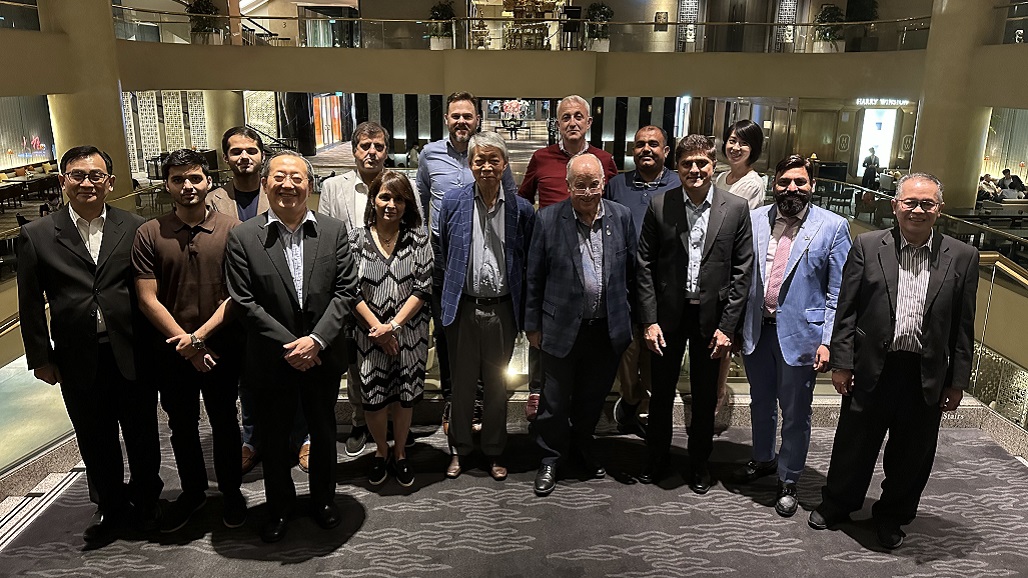Successful CACCI Presidential Visit to Taiwan on 17-18 May 2023 - Full report
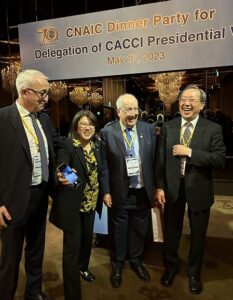 CACCI President Mr. Peter McMullin AM and representatives from various CACCI Primary Members visited Taipei on May 17-18, 2023 to meet with officers of CACCI Primary and Affiliate Members in Taiwan – namely, the Chinese International Economic Association (CIECA) Taiwan, the Chinese National Association of Industry and Commerce (CNAIC) Taiwan, and the Importers and Exporters Association of Taipei (IEAT) – as well as to make courtesy calls on key government officials of Taiwan and other organizations involved in promoting trade and investment cooperation between Taiwan and other countries. The CACCI delegation also visited local business enterprises engaged mainly in the ICT sector to obtain information on their products and services and other related activities and explore possible areas of business cooperation.
CACCI President Mr. Peter McMullin AM and representatives from various CACCI Primary Members visited Taipei on May 17-18, 2023 to meet with officers of CACCI Primary and Affiliate Members in Taiwan – namely, the Chinese International Economic Association (CIECA) Taiwan, the Chinese National Association of Industry and Commerce (CNAIC) Taiwan, and the Importers and Exporters Association of Taipei (IEAT) – as well as to make courtesy calls on key government officials of Taiwan and other organizations involved in promoting trade and investment cooperation between Taiwan and other countries. The CACCI delegation also visited local business enterprises engaged mainly in the ICT sector to obtain information on their products and services and other related activities and explore possible areas of business cooperation.
It was the first Presidential visit led by Mr. McMullin since he assumed the CACCI Presidency in November 2022 in Melbourne, Australia. The Presidential visits are intended to give the CACCI President and CACCI members the opportunity to gather first-hand information on the business situation in the host country; further build up the image of CACCI by making courtesy calls on key government officials; and meet business leaders in the country, particularly those from industries or sectors that the host country wishes to promote.
The two-day visit provided the delegation the opportunity to strengthen ties between CACCI and Taiwanese government officials and businessmen, and to seek their support for the Confederation and its activities. During their various meetings with private and government sector representatives in Taiwan, Mr. McMullin and members of his delegation introduced CACCI, elaborating on the Confederation’s objectives and what it does to encourage cooperation among businessmen in the region. They also exchanged views on the local business conditions; areas of opportunities for business, trade and investment; and policies set in place by the Taiwanese government to attract foreign investors.
The CACCI delegation was composed mostly of chamber executives and businessmen from eight CACCI member countries looking at possible business and investment opportunities or considering expansion of their existing businesses in Taiwan, and to invite them to consider their respective countries as a Taiwanese investment destination. A complete list of the Taiwan visit delegation is presented at the end of the report.
The program of the visit was arranged by CIECA through its Chairman Mr. Henry Kao, with the support of the CNAIC and IEAT.
16 May 2023
Members of the delegation who arrived the day before the official start of the visit attended the dinner hosted by Mr. Harvey Chang, Chairman of the CACCI Advisory Board and CACCI President Emeritus. Mr. Chang served as CACCI President for two terms from 2010 to 1014.
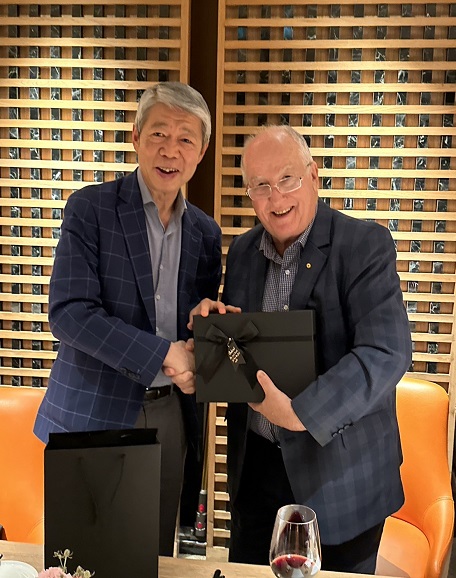
The dinner provided the attendees the opportunity to introduce themselves to each other and to know more of their businesses and their other interests, thereby setting the stage for more camaraderie over the next two days. Mr. Chang also took the occasion to present tokens of appreciation to Mr. McMullin and to CACCI Former President Mr. Jemal Inaishvili from Georgia.
CACCI Vice President Mr. Khurram Sayeed from Pakistan also presented Mr. McMullin a CACCI pin which he had made in Pakistan.
17 May 2023
Courtesy Call on the Ministry of Economic Affairs
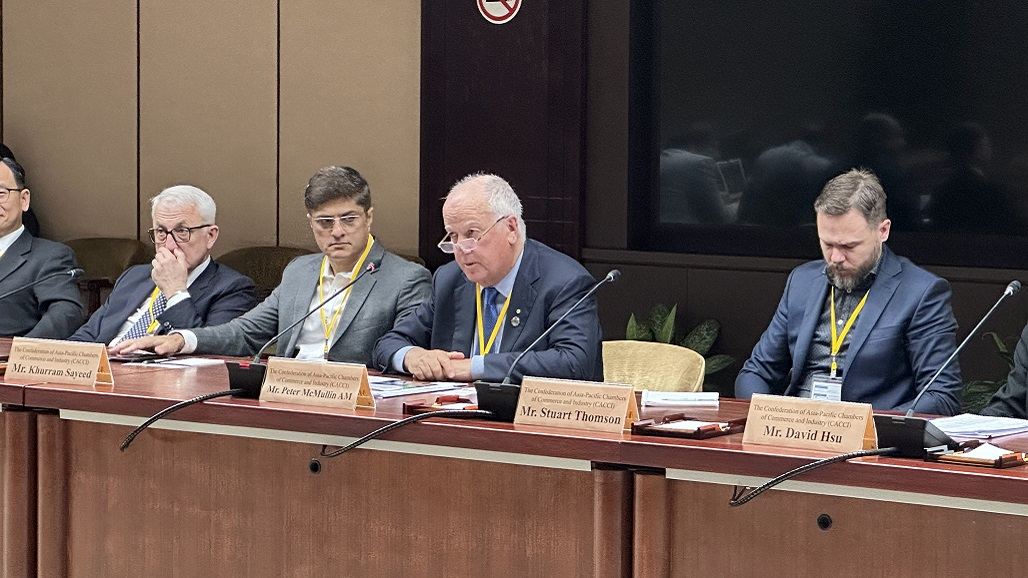
The delegation was warmly received by key officers of the Ministry of Economic Affairs (MOEA) and the Bureau of Foreign Trade led by Deputy Minister Chern-Chi Chen.
In his welcome Remarks. Deputy Minister Chen informed the visitors that the MOEA is responsible for formulating policy and laws for industry and trade, foreign direct investment, energy, minerals, measurement standards, intellectual property, and state-owned enterprises.
He also pointed out that the global environment is currently faced with many political challenges and that the support of the chambers of commerce is needed in the effort to deal with these challenges. He said that local business groups such as CIECA and CNAIC have been doing their part in strengthening Taiwan’s foreign relations and implementing the Taiwanese government’s trade policies aimed at promoting and stabilizing trade relations with other countries, including China.
Deputy Minister Chen likewise stressed the ongoing efforts of his government to expand relations with its ally countries including the US, the EU, Japan, Southeast Asian countries, South Asian countries, Australia and New Zealand.
In response, Mr. McMullin thanked the MOEA for the strong support that the Taiwanese government has extended CACCI over the years. He also pointed out that:
(a) CACCI was established in 1966 – with its organizational meeting held in Taipei – to provide a platform for networking and cooperation among businessmen in the region. Taiwan – through CNAIC under the chairmanship of the late Dr. Koo Chen-Fu – was one of the founding members.
(b) Under the initiative of the late Dr. Jeffrey L. S. Koo – who was Past CACCI President – Taiwan offered in 1981 to host the Permanent Secretariat of CACCI, making it one of the first and few regional organizations with headquarters in Taiwan.
(c) CACCI’s current membership includes 28 national chambers of commerce and industry from 26 Asian countries and independent economies – including CNAIC and CIECA from Taiwan as Primary Members and the Importers and Exporters Association of Taipei (IEAT) as Affiliate Member.
(d) CACCI has working relationships with other regional and international organizations such as the International Chamber of Commerce, the Eurochambres, the ASEAN Business Advisory Council, the APEC Business Advisory Council, the Pacific Alliance, the Indian Ocean Regional Association, the B20, the World Trade Organization, the SAARC CCI, and the Asian Development Bank, among others.
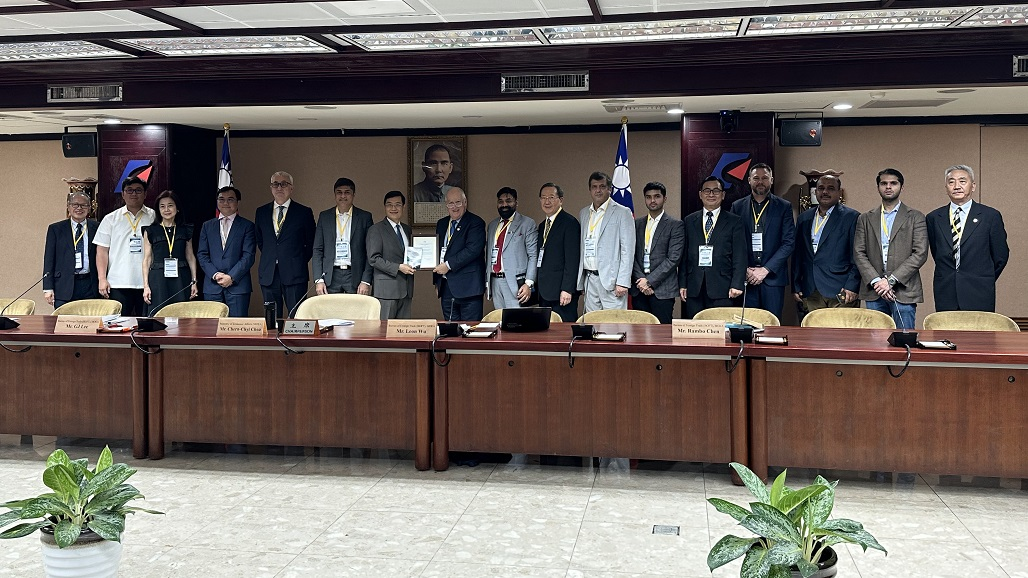
(e) CACCI has consultative status with the United Nations and a member of the Conference of Non-Government Organizations (CoNGO) under the UN umbrella.
(f) Taiwan – through CNAIC, CIECA, and IEAT – has always taken an active role in the Confederation. Among others:
- Taiwan has hosted CACCI six annual gatherings (Council Meetings and Conferences in 1966, 1980, 1984, 1988, 2006 and 2016), two CACCI Summit Meetings (2011 and 2016), and one Presidential Visit in 2018.
- CACCI has had three Presidents from Taiwan – Dr. C. F. Koo, Dr. Jeffrey L. S. Koo, and Mr. Harvey Chang.
(g) Given the geographical scope of its membership, CACCI provides a good platform to promote Taiwan’s New Southbound Policy in its 18 target countries (12 of which are within the geographical scope of CACCI’s membership) , providing the Taiwanese business community the opportunity to reach out into the regional market, as well as for the Taiwanese government to promote its trade and investment policies in the region.
(h) While in Taipei, the CACCI delegation will meet with representatives of local companies engaged mainly in ICT activities to exchange information on mutual interest and explore possible areas of business cooperation.
Mr. McMullin expressed his hopes that Taiwan – through CIECA, CNAIC and the IEAT – will remain actively involved in the Confederation, stressing that CACCI certainly needs Taiwan’s continued strong representation in the group, given the important role that the country’s economy and business sector play in the development of the Asia-Pacific region.
He also Informed Deputy Minister Chen that the 2023 CACCI Conference will be held in Phnom Penh, Cambodia on October 30-31, with the Cambodia Chamber of Commerce as host, pointing out that the event will provide another opportunity for CACCI members and other businessmen in the region to exchange views on issues of current interest to the business sector. He said that he is hoping there will be another good turnout of Taiwanese participants in this year’s Conference.
He also explored with the Deputy Minister the possibility that Taiwan – through the initiative of CNAIC, CIECA and IEAT and the support of the Taiwanese government – can host another CACCI Conference in the near future, emphasizing that this will provide CACCI members from other countries the opportunity to:
- meet with local businessmen and policymakers and gain first-hand information about the current economic and business condition in Taiwan and the market opportunities it offers;
- learn more about the Taiwan government’s current trade and investment policies and the industry sectors in which foreign investors are being encouraged to consider; and
- explore possible areas of economic cooperation, joint ventures and other forms of business collaboration between Taiwan and other countries in the region;
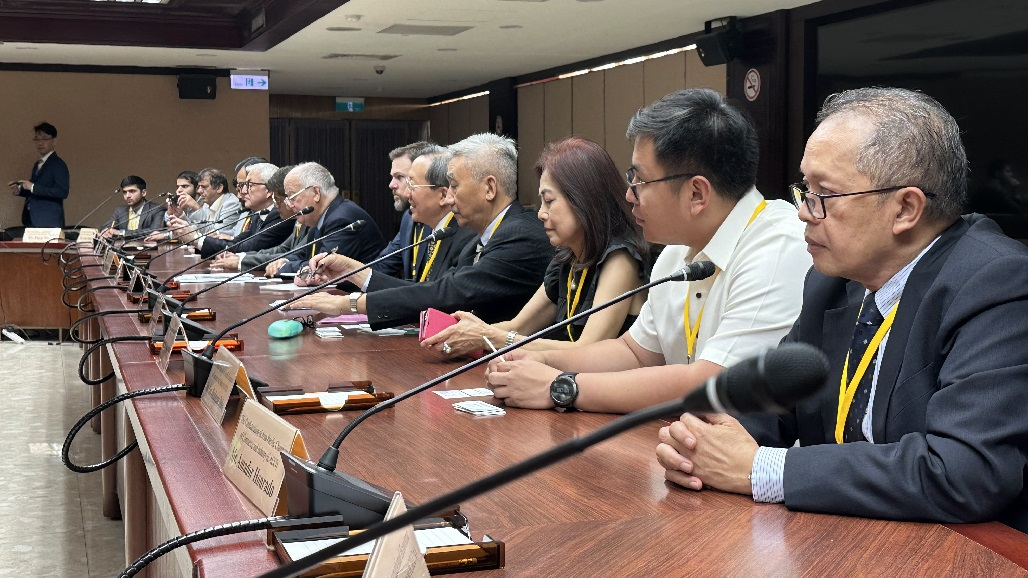
During the Q&A session, the following points were raised by some members of the CACCI delegation:
(a) Mr. Khurram Sayeed from Pakistan informed the Deputy Minister that the current level of bilateral trade between Pakistan and Taiwan is negligible, with Pakistan’s trade with Taiwan representing only 0.1% of the latter’s trade.
(b) He said that for bilateral trade to increase, it is important to improve people-to-people contact, which can be done by easing visa applications between the two countries. He cited the current difficulty for Pakistani businessmen to secure Taiwanese visa. However, he noted that for the CACCI Presidential visit to Taiwan, the Pakistani delegates obtained their visa easily due to the assistance and facilitation of CACCI.
(c) Mr. Sayeed therefore proposed the possibility of enabling CACCI to help facilitate the visa issuance process through setting up a mechanism with the Taiwanese government for this purpose.
(d) Deputy Minister Chen concurred with Mr. Sayeed on the importance of more people-to-people contact to improve trade between two countries. He suggested that CACCI can help request the Pakistani government to send a message to the Taiwanese government on this matter, and he offered to broker the process.
(e) Mr. Atif Iqbal from Pakistan said that the strength of multilateral relations depend much on the ease and cost of doing business. He pointed out that Pakistan has many attractions as an investment destination such as land and talent availability in the country and a young population (some 60% of its people are below 30 years of age), and that it offers many opportunities for joint ventures between Pakistan and Taiwan (for instance, in the pharmaceutical industry).
(f) Deputy Minister Chen remarked that Taiwan does need start-ups in the wind and solar energy, which is increasingly becoming a major energy source of the island.
(g) Mr. Dennis Hu, Chairman of the CACCI ICT Council, identified possible areas of collaboration between Taiwan and other countries (including Pakistan) such as in the area of Smart Healthcare (e.g., intelligent hospitals), Smart Energy System (e.g., energy allocation), and in the development of young talents (e.g. ,digital skilling).
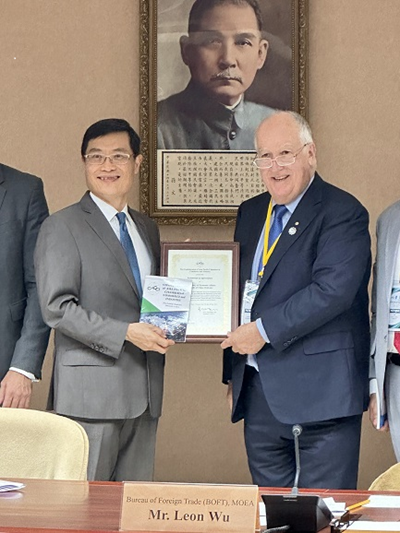
(h) On the issue of young talent development, Deputy Minister Chen said that Taiwan can offer small-scale training programs for specific countries.
(i) Mr. McMullin pointed out that Australia has a very developed MICE program and can therefore collaborate with Taiwan in this area. He also cited the important role of chambers as merchants of peace, taking the lead in addressing the supply chain issues, reforming the world training system, digital transformation of businesses, ESG issues, and promoting SMEs as well as young and women entrepreneurs.
(j) Deputy Minister agreed on the importance of facilitating the digital transformation of businesses, and noted that in this regard, the Taiwanese government has set up the Ministry of Digital Affairs (MODA) to help create a policy environment that will facilitate the digital transformation of businesses (e.g., develop benchmarks, content control, etc.).
(k) Dr. G. J. Lee, Deputy Director-General of the Bureau of Foreign Trade, Taiwan urged the CACCI delegation to take advantage of CACCI’s platform to visit more frequently, and for using Taiwan as a platform for reaching out into the regional market.
(l) Mr. Jemal Inaishvili informed the meeting that while his country Georgia is a relatively small market, there are representatives from big Taiwanese shipping companies operating in the country such as Evergreen, since Georgia provides good access to the European market. He therefore considered Tbilisi, Georgia as a new frontier for Taiwan.
(m) At the end of the meeting, Mr. McMullin presented a Testimonial of Appreciation to MOEA for receiving the CACCI delegation and providing them the opportunity to have a dialogue on issues of mutual interest. In exchange, Deputy Minister Chen also presented a gift to Ms. McMullin as a token of appreciation for visiting Taiwan and making a courtesy call on the MOEA.
Guided Tour of the CTBC Financial Park
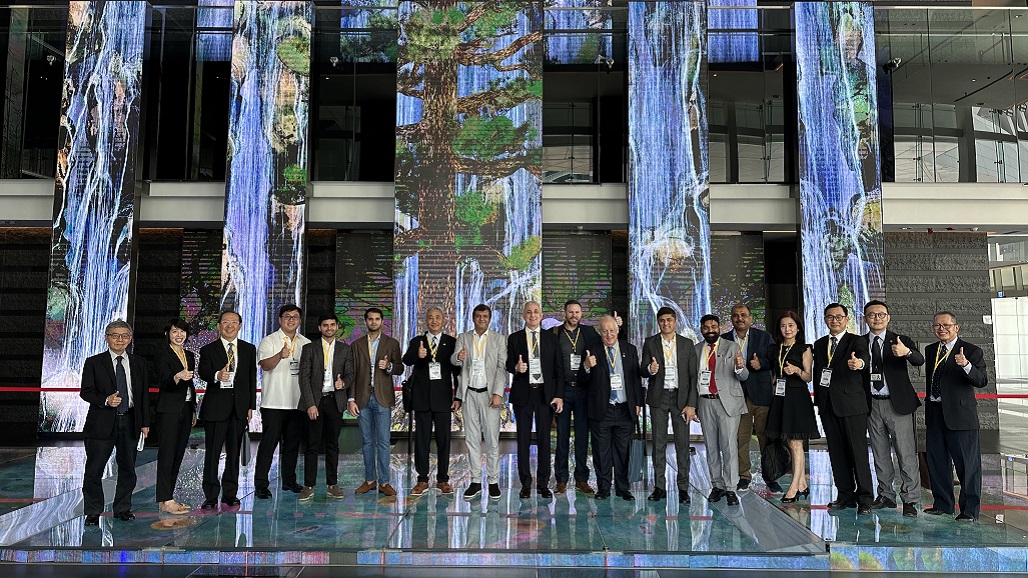
From the MOEA, the delegation proceeded to the CTBC Financial Park, which is the headquarters of the CTBC Financial Holding, the company founded originally by the Koo family, including the late Dr. Jeffrey L. S. Koo, former CACI President and one of the pillars of the Confederation. The CTBC Financial Park, or Chinatrust Commercial Bank Headquarters, is a skyscraper office complex located in Nangang District, Taipei, Taiwan.
Construction of the complex began in 2010 and it was completed in 2013. The complex consists of three towers with a total floor area of 266,290 m².
The delegation was given a brief introduction on the CTBC Financial Park and later visited the CTBC Museum, where they were provided information on the history and founders of CTBC, its development and growth into what it is now – the biggest private commercial bank in Taiwan and considered the most international among the Taiwanese commercial banks with presence in many countries in Asia, Europe and the US.
Luncheon Hosted by Former Chairman of the CACCI Budget Commission
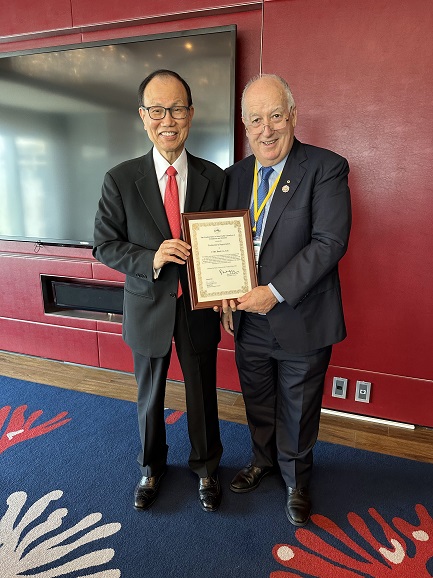
Following the guided tour, the visitors went up to the 19th Floor of the CTBC Financial Park for lunch hosted by Mr. Steve Hsieh, former Chairman of the CACCI Budget Commission.
During lunch, Mr. Hsieh, who also serves as Chairman of the Taiwan Lottery Corporation, handed out three sets of complimentary lottery scratch cards to each delegate. Four of the delegates won prizes ranging from 200 NTD to 500 NTD.
At the end of the meeting, Mr. McMullin presented a Testimonial of Appreciation to Mr. Hsieh for warmly receiving and hosting lunch for the CACCI delegation, and for giving them a guided tour of the CTBC Financial Park.
Courtesy Call on National Development Council
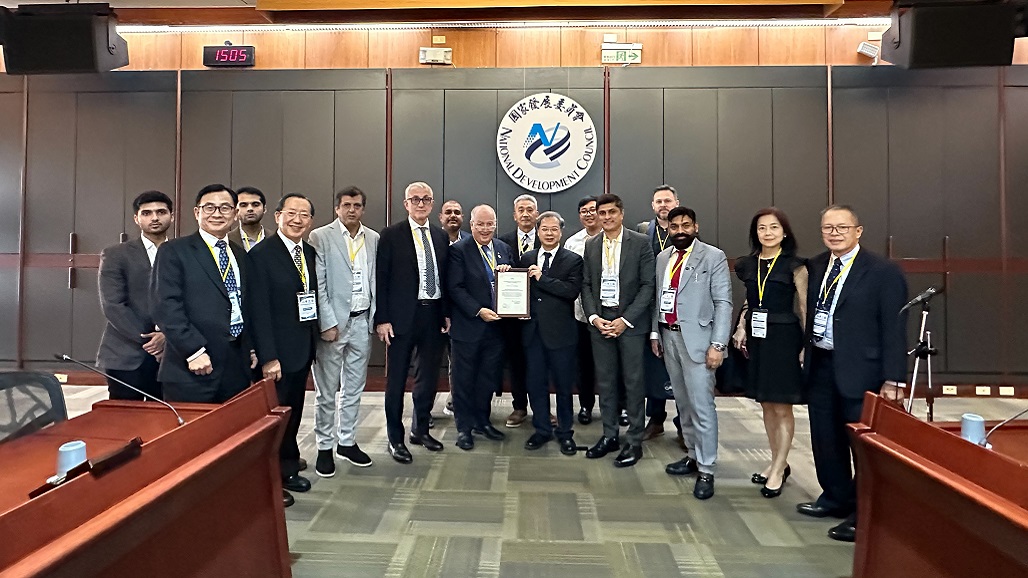
After lunch, the delegation went on for a courtesy call on the National Development Council (NDC), where they were received by NDC officers led by Minister Kung Ming-Hsin and Ms. Connie Chang, Director-General of the Department of Overall Planning.
During the meeting, the visitors learned that the NDC is the policy-planning agency of the Executive Yuan of the Republic of China. It has various departments covering Overall Planning, Economic Development, Social Development, Industrial Development, Human Resources Development, National Spatial Planning and Development, Supervision and Evaluation, and Regulatory Reform.
The CACCI visitors learned that since 2016, Taiwan has initiated development policies and activities covering the three major areas of industrialization, Smart City development, and Digitalization. For instance, the country has hosted events on smart city solutions.
The NDC officials pointed out that in the year 2018, the world saw the beginnings of China-US tensions, the onset of Covid pandemic in 2019 which impacted on the global value of supply chain and necessitated supply chain restructuring.
The NDC also underscored the importance of CPTPP for Taiwan to be part of regional economic integration and called on other countries, including those that are within the geographical scope of CACCI’s membership, to support Taiwan’s commitment to join the CPTPP.
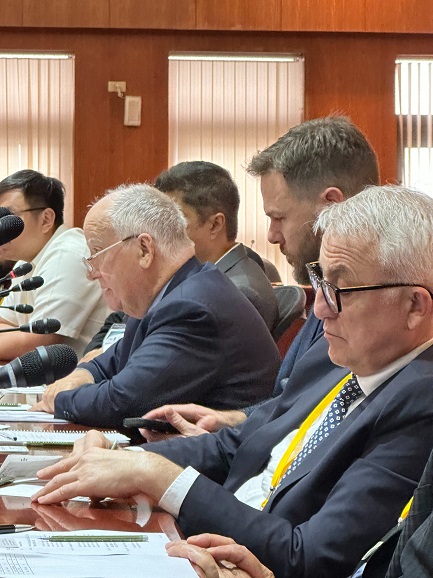
For his part Mr. McMullin underscored the SET principle that he intends to pursue during his CACCI Presidency under the general theme of “Chambers of Commerce: Getting Business SET for the Future,” namely:
(S) Sustainability is critical for SMEs to gain a competitive advantage in today’s market, to be able to manage business risks, grow their brand and enhance their access to capital.
(E) Entrepreneurship and particularly inclusive entrepreneurship supports people with new ideas to solve some of our most entrenched challenges. By supporting entrepreneurs embrace new technologies, support diverse groups of entrepreneurs and allow for innovation to flourish, new business models emerge to move the region toward a truly just economy.
(T) Trade support is a critical service Chambers provide to the business community. Trade not only helps business supply the world with the goods and services we all desire, it also builds and maintains cross border relationships. Through this work Chambers are truly strengthening global multilateralism and in-turn global peace.
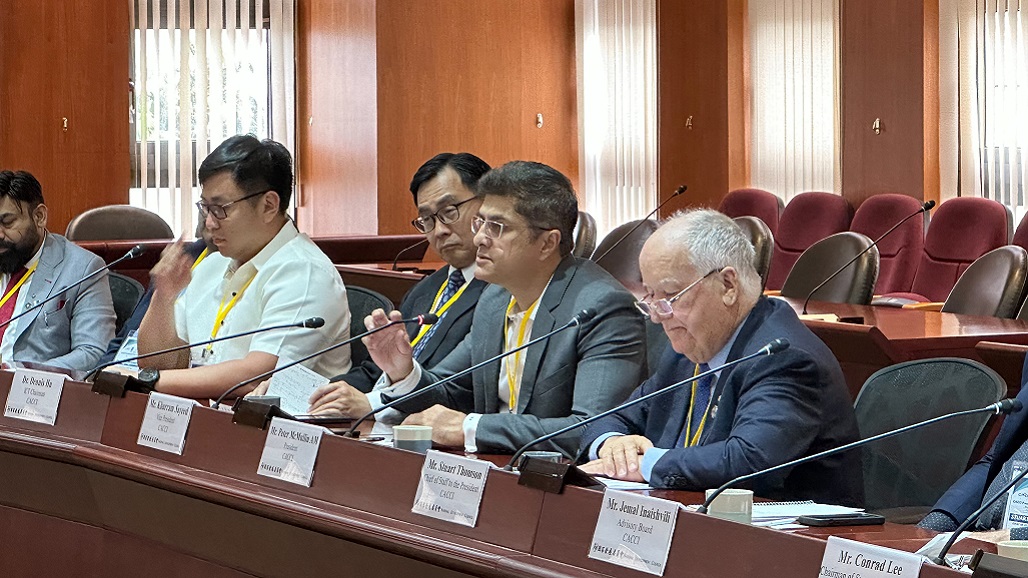
Mr. Sayeed reiterated the same points he raised during the courtesy call on the MOEA, namely, the need to ease visa issuance in order facilitate person-to-person contact, using CACCI representative in Pakistan to help facilitate and issue visa recommendation for Taiwan, Pakistan’s advantage of having a young population, and extending an invitation to the Taiwanese government to visit Pakistan to get first-hand information on the country’s business, trade and investment opportunities.
The NDC conveyed an invitation to young Pakistanis to visit and study in Taiwan – taking advantage of the Taiwanese government’s current policy of expanding scholarships program to international students – and obtain training in such sectors as ICT, semiconductor, software development and textile industry, among others. Taiwanese delegation (perhaps led by CIECA, CNAIC and IEAT) can also be organized to Pakistan to discuss and explore possible collaboration in important industries such as renewable energy and biomedicine.
Mr. Atif Iqbal from Pakistan suggested the possibility of establishing a Business Council between Pakistan and Taiwan as a vehicle for further increasing economic, trade and investment cooperation between the two countries.
At the end of the meeting, Mr. McMullin presented a Testimonial of Appreciation to NDC for receiving the CACCI delegation and providing them the opportunity to have a dialogue on issues of mutual interest.
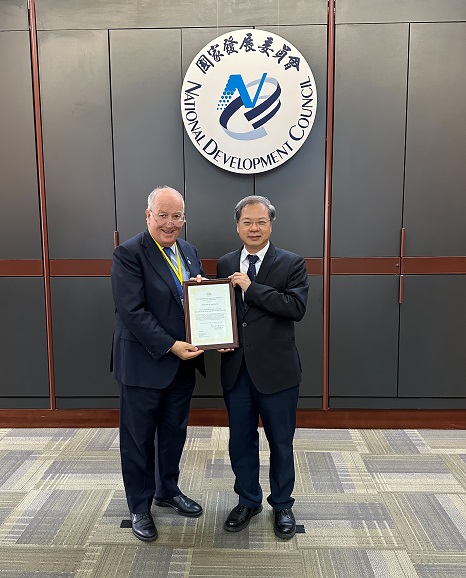
Courtesy Call on the Ministry of Foreign Affairs
The CACCI group proceed to make a courtesy call on the Ministry of Foreign Affairs (MOFA) where they were welcomed by MOFA officers led by Deputy Minister Tien Chung-kwang.
Deputy Minister Tien said that Taiwan is proud to have the CACCI’s Secretariat set up in Taiwan as it provides them an effective channel to reach out into CACCI’s member countries in the region and beyond as well.
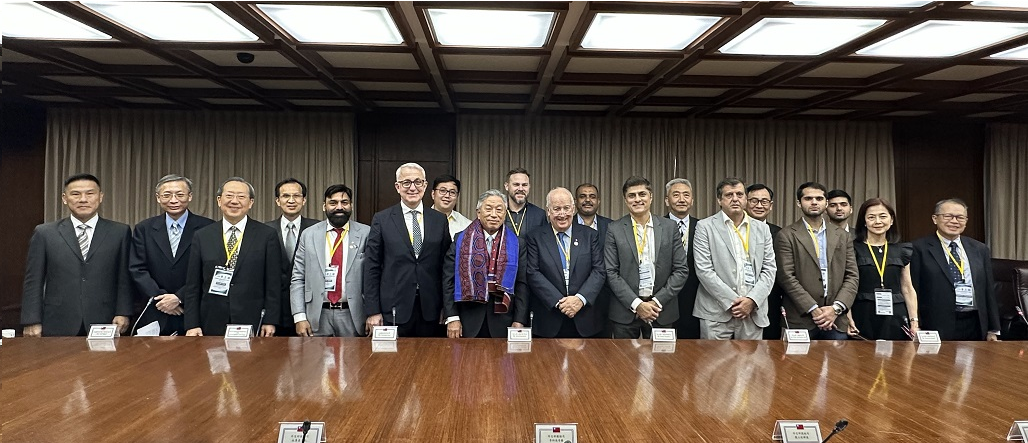
He informed the delegation of the humanitarian assistance that Taiwan has extended to countries that need it, such as those affected by the Ukraine-Russia conflict. He added that Asia is a very important region since some 50% – 60% of energy and food supply sail across its waters. The current fragile situation brought about by the current challenges should serve as a catalyst for governments and businesses to work together to address these challenges.
The Deputy Minister also cited Taiwan’s New Southbound Policy which he said has been setting in place the right policies for improving trade relations, people connection, and training of students and young people. He further sought the support of CACCI member countries for its bid to join the CPTPP as its participation in the agreement is important for Taiwan and is also expected to benefit other Asian countries.
Mr. McMullin mentioned the same points he raised during the delegations’ meeting with previous government agencies, namely: (a) the important role played by Taiwan in the activities of CACCI’s ; (b) the SET principle he plans to follow during his CACCI presidency; (c) the support of CACCI in addressing the challenges faced by Taiwan as well as its application for CPTPP membership; and the (d) important role played by chambers in general as merchants of peace through its continuous effort to conduct dialogue for peaceful relations through business.
Mr. Sayeed raised the same points he mentioned during the courtesy call on the previous government office, namely, the need to ease visa issuance in order facilitate person-to-person contact, using CACCI representative in Pakistan to help facilitate and issue visa recommendation for Taiwan with the endorsement of MOFA, Pakistan’s advantage of having a young population, and extending an invitation to the Taiwanese government to visit Pakistan to get first-hand information on the country’s business, trade and investment opportunities.
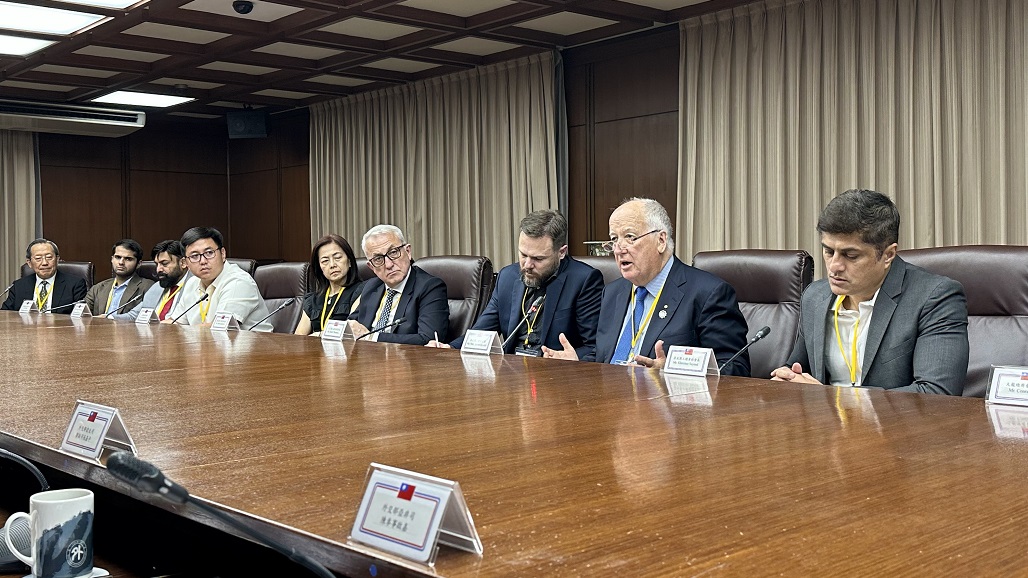
In response, the Deputy Minister said that as a short-term solution to the visa issue, he expressed his willingness to personally facilitate visa approval for Pakistani businessmen visiting Taiwan. But he cited the need for a long-term solution, which is a matter that needs to be discussed between the two governments in the future. He adds that Taiwan totally appreciates the potential for greater economic relationship between Pakistan and Taiwan and should therefore need to look at how to improve mobility of businessmen between the two countries.
Mr. Atif Iqbal from Pakistan also reiterated the points he raised previously with the other government offices visited, and once again suggested the possibility of establishing a Business Council between Pakistan and Taiwan as a vehicle for further increasing economic, trade and investment cooperation between the two countries. He further mentioned possible cooperation in the healthcare sector, such as the implementation of a borderless doctor program similar to that of SAARC. He said that there are currently 400 active pharmacies in Pakistan which can work with Taiwan, which could be a huge market for pharmaceutical products from Pakistan.
The Deputy Minister cited the importance of medical connectivity. In this regard, he mentioned the One Country, One Centre Program of Taiwan, under which mobile teams can inspect the situation in other countries such as Tuvalu every two to three months. He recognized the importance of the cooperation of doctors, the availability of machines for remote places, and smart health care system for remote consulting diagnosis, state-of-the-art diagnostic system, and tele-surgery. He said that as a starting point, Taiwan and Pakistan can have exchange visits for teams of specialists or pharmaceutical representatives.
Mr. Inaishvili expressed the group’s appreciation for the help extended by Taiwan to countries that were impacted heavily by the Covid pandemic. He acknowledged the important role of Taiwan in being the first country to notify the world of the onset of the pandemic in late 2019. He also cited the strategy of some countries of weaponizing trade. For instance, when Australia started an investigation on the source of Covid, China was antagonized and in retaliation, blocked the import of red wine from Australia.
Mr. Conrad Lee from Kowloon Chamber of Commerce (KCC) said that KCC aims to serve as a bridge between Hong Kong, China and Taiwan. However, this has been made a little more difficult since Hong Kong has changed a lot in recent years, affecting Taiwan – Hongkong relationship. He pointed out that if the system is not free, business cannot be free.
At the end of the courtesy call, Mr. McMullin presented a Testimonial of Appreciation to MOFA for receiving the CACCI delegation and giving them the opportunity to have a dialogue on foreign policy issues and other matters of mutual interest.
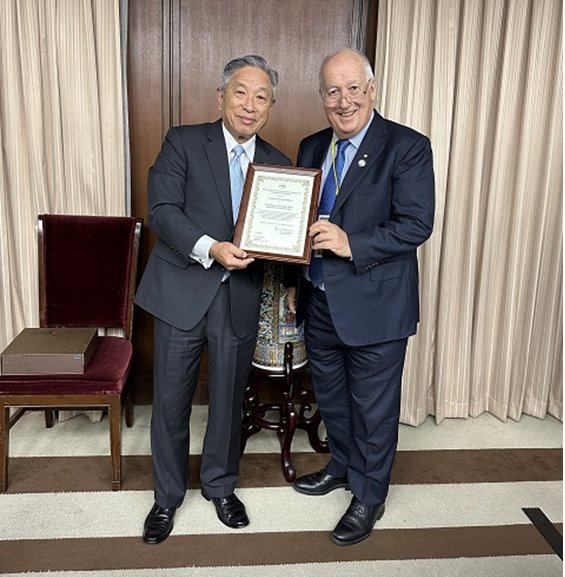
Meeting with Chinese National Association of Industry and Commerce, Taiwan (CNAIC)
The delegation then proceeded to the headquarters of the Chinese National Association of Industry and Commerce, Taiwan (CNAIC), a CACCI Primary Member in Taiwan, where they were received by CNAIC officers and members headed by Chairman Mr. Thomas T. L. Wu.
In his Welcome Remarks, Mr. Wu congratulated Mr. Peter McMullin on his election as CACCI President during the CACCI Conference held in November 2022 in Melbourne, Australia. He also praised Mr. McMullin for having been responsible for the recent admission of Singapore Manufacturing Federation (SMF) as the newest Primary Member of CACCI.
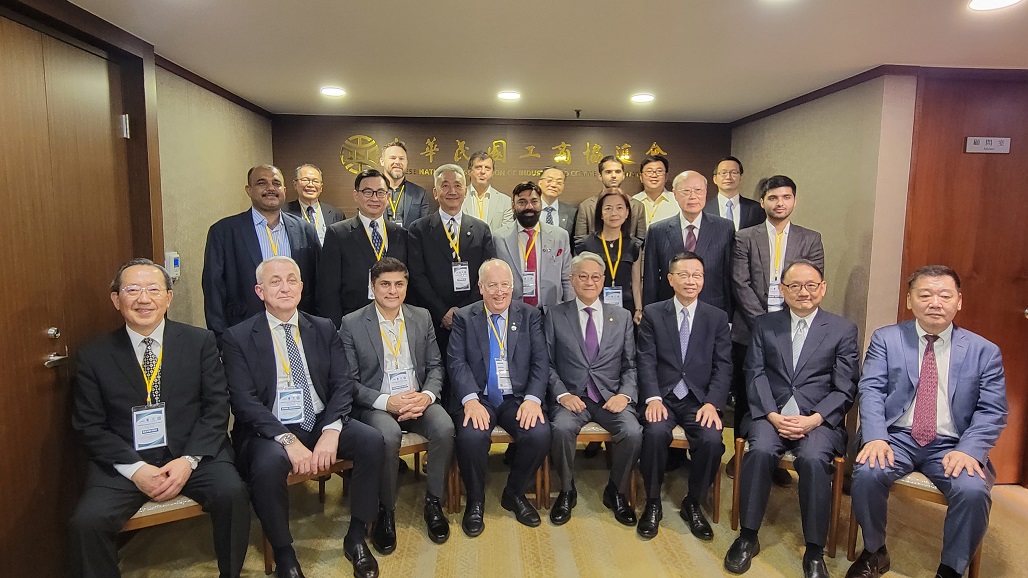
The delegation learned from Mr. Wu that the CNAIC was founded in 1952 as the first nationwide business organization. Many of its former Chairmen had taken active roles in CACCI, including the late Dr. Koo Chen-Fu and Dr. Jeffrey L. S. Koo. With a current membership of approximately 1,100 members affiliated with large corporations as well as SMEs, the CNAIC today provides regular financial advice to the government on behalf of the business community; promotes international industrial cooperation and cross-strait economic and trade exchanges; strengthens member services, organizes economic and trade-related activities and provides the latest business information; and provides latest information on global economic trends.
In response, Mr. Peter McMullin AM thanked Mr. Wu and its key officers and members for taking time from their busy schedules to meet with the CACCI delegation from several countries. He took the opportunity to introduce CACCI, underscoring the role it plays as a platform for people-to-people contact to improve inter-relationships – which is important not only for the Confederation but for the region as a whole in order to create a business environment conducive for business cooperation. He expressed his appreciation to Taiwan – as represented by CNAIC and other Taiwanese members in Taiwan – for recognizing the value of business relationships through its support of CACCI.
Mr. McMullin said he considered businessmen as merchants of peace because of the role they play in improving the economic standing of communities around the globe and therefore ensuring the absence of any conflicts. He mentioned that CACCI follows the SET concept – Sustainability, Entrepreneurship, and Trade – as the guiding principle for CACCI to make it well-positioned to address many challenges and issues faced by the global market environment.
He also took the opportunity to invite CNAIC and its members to send a big delegation to the 37th CACCI Conference to be held in Cambodia on October 30-31, 2023.
During the Q&A session, the following discussions took place:
(a) Mr. Sayeed once again cited the need to ease visa issuance in order facilitate person-to-person contact; stressed Pakistan’s advantage of having a young population; invited CNAIC members to visit Pakistan to get first-hand information on the country’s business, trade and investment opportunities and gain access to thousands of FPCCI members and set up businesses in Pakistan particularly in import-substituting industries, thereby helping solve the foreign reserves problem of Pakistan.
(b) Mr. Atif Iqbal from Pakistan noted that Pakistan exports pharmaceutical products to other countries with the Pakistani government’s push to promote the export of medicines, and encouraged Taiwanese government and businessmen to consider working with Pakistan in improving the standards of pharmaceutical production in order to meet international requirements. He also cited the opportunities in the construction industry of Pakistan, which currently imports building materials from China and Europe. Taiwan can serve as an additional source of construction products for Pakistan.
(c) CNAIC Chairman Mr. Wu informed Mr. Iqbal that the CNAIC has established a Committee that looks at Smart Health Care Program. This Committee can work with FPCCI in exploring possible areas of cooperation. He also informed the visitors that Taiwan is increasingly becoming a Muslim-friendly country, providing facilities and services that cater to the needs of Muslims (e.g., prayer rooms at the airport, restaurants that serve halal food, and the presence of a Muslim mosque in Taipei that has received leaders from Muslim countries in the past).
Dinner hosted by Chinese National Association of Industry and Commerce, Taiwan (CNAIC)
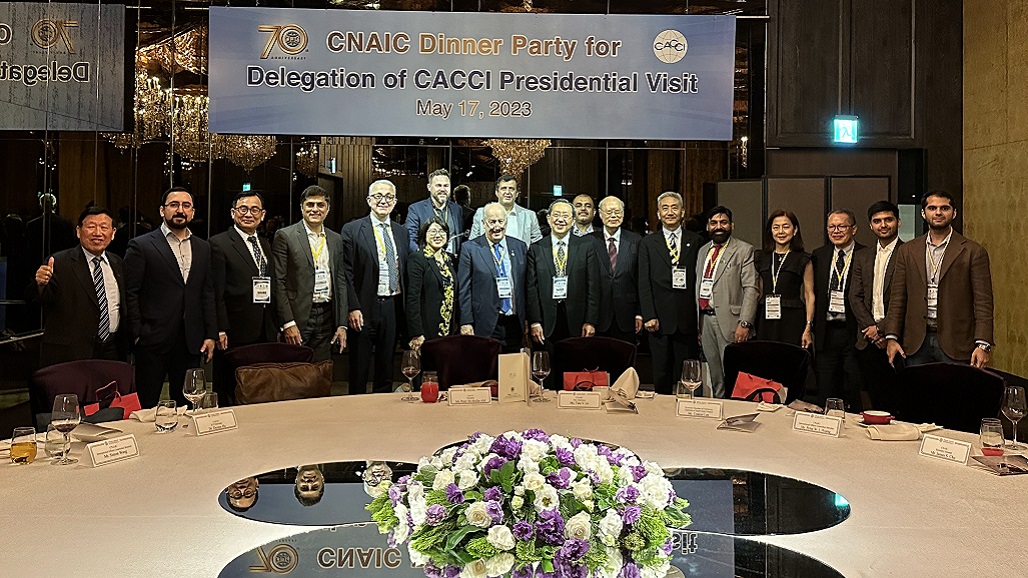
The CACCI delegation was then hosted by the CNAIC in a dinner held at Palais de Chine Hotel in a restaurant that had been awarded the three-star Michellin recognition, the only one given such recognition among the restaurants in Taiwan.
At the end of the dinner, Mr. McMullin and Mr. Wu exchanged tokens of appreciation for the opportunity to meet and exchange ideas on matters of mutual interest.
18 May 2023
Visit to MiTAC Information Technology Corporation
The second day of the two-day program started with a visit to MiTAC Information Technology Corporation where they were received by key officers of the company headed by Chairman Dr. Robert Ting.
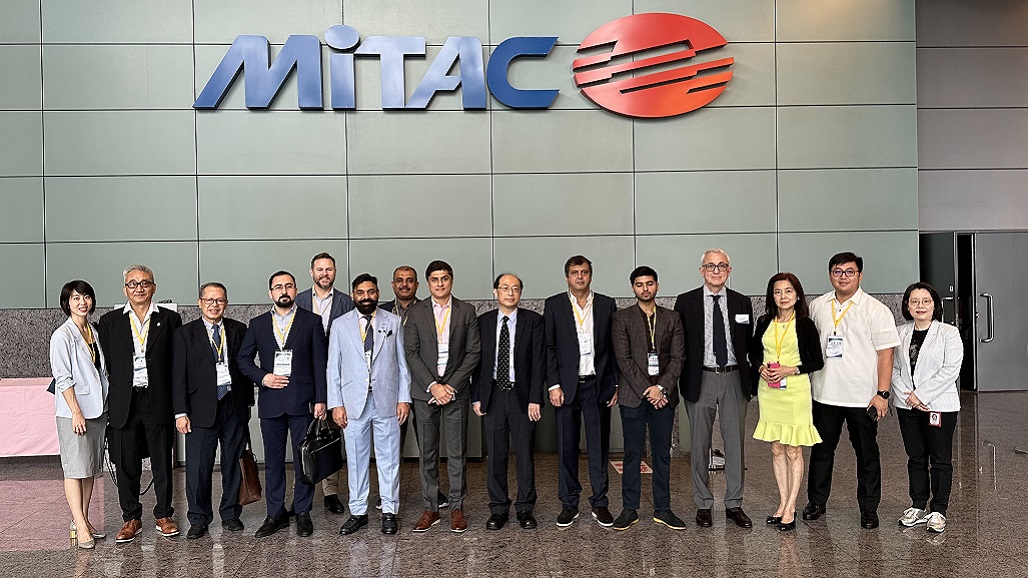
The visitors were first given an introduction on the company, including its history, its growth and development over the years, its milestones, and the range of its current product lines. Among others, they learned that MiTAC Information Technology Corporation is a professional IT solution provider, providing total solutions from edge to cloud with advanced R&D, TCO and worldwide operations, and with an annual revenue of about US$90 Billion.
They were further informed that the company’s current IT solutions cover Smart Transportation, Smart Enterprise, Smart Security, Smart Government, Smart Education, Smart Manufacturing, and Smart Finance. The visitors were also given the opportunity to experience virtually each of these IT solutions.
The delegation later visited the Innovation and New Product Centre of the company where they learned some of its recent and upcoming products and IT solutions, as well as the projects that they been commissioned to develop and implement in other countries such as the Philippines, Indonesia, and India.
Some members of the delegation expressed interest to consider possible areas of cooperation with MiTAC Information Technology in developing and implementing IT solutions in the various areas of expertise of the company.
At the end of the visit, Mr. Jemal Inaishvili presented a Testimonial of Appreciation to MiTAC Chairman Dr. Ting for receiving the CACCI delegation and giving them the opportunity to learn more about the company and possible areas in which they can cooperate with CACCI member countries in providing IT solutions.
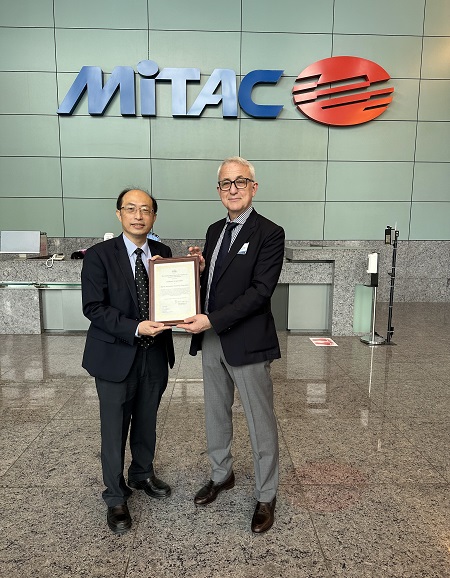
Visit to Delta Electronics, Inc.
From MiTAC Information Technology, the delegation proceeded to the headquarters of Delta Electronics, Inc., a Taiwanese electronics manufacturing company where they were welcomed by its key officers led by Senior Consultant Mr. R. T. Tsai.
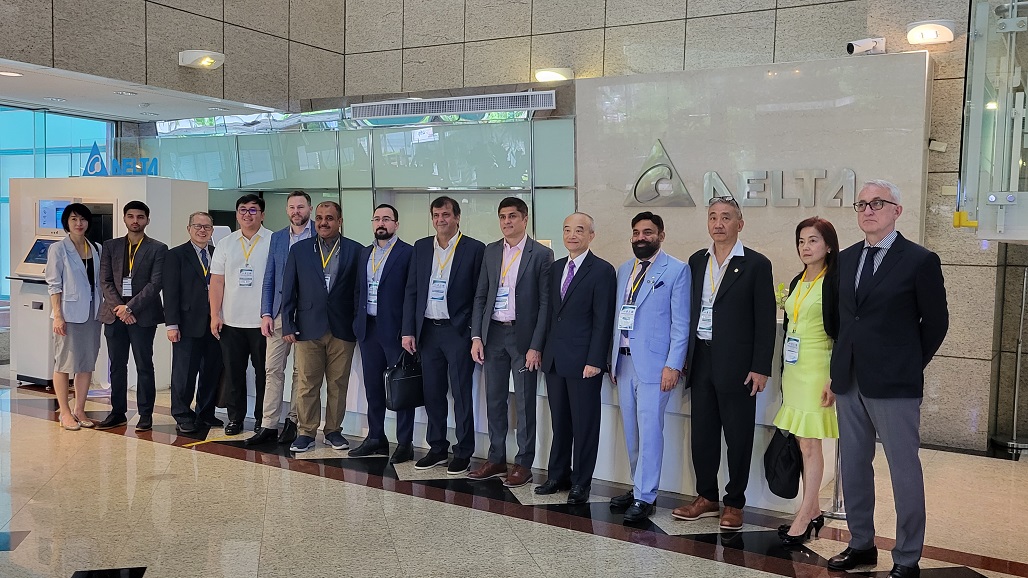
The visitors were informed that Delta Electronics was founded in 1971 primarily to serve as a global provider of power and thermal management solutions, and that:
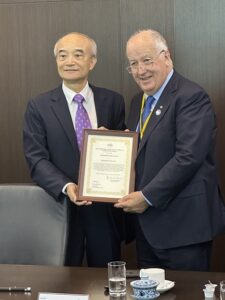 (a) The company focuses on addressing key environmental issues such as global climate change. As an energy-saving solutions provider with core competencies in power electronics and automation, Delta engages in business categories that include Power Electronics, Automation, and Infrastructure.
(a) The company focuses on addressing key environmental issues such as global climate change. As an energy-saving solutions provider with core competencies in power electronics and automation, Delta engages in business categories that include Power Electronics, Automation, and Infrastructure.
(b) Delta offers some of the most energy efficient power products in the industry, including switching power supplies with efficiency over 90%, telecom power with up to 98%, and PV inverters with up to 99.2% efficiency.
(c) The company regularly invests over 8% of its annual sales revenues in R&D and has worldwide R&D facilities in China, Europe, Japan, Singapore, Thailand, and the U.S.
(d) The company has approximately 200 facilities worldwide including manufacturing, has an annual turnover of US$13 Billion, and that it has regional market centers in Thailand and the Middle East region.
The delegation was also shown the company’s wide range of products covering the following areas:
(1) Industrial Automation Solutions
(2) Building Automation Solutions
(3) Data Center Solutions
(4) Telecom Energy Solutions
(5) Smart Energy Solutions
(6) Display and Monitoring Solutions
(7) EV Charging Solutions
During the Q&A session, the delegation raised a number of points, including possible market arrangements in Pakistan and Georgia, after-sales service in Pakistan, opportunities in the construction industry in Pakistan, and opportunities in Iranian industries that are not covered by the US sanctions such as food and agriculture, textiles, and energy, among others.
At the end of the visit, Mr. McMullin presented a Testimonial of Appreciation to Mr. Tsai for receiving the CACCI delegation and giving them the opportunity to learn more about the company and its various product lines, and identify possible areas of cooperation with CACCI member countries.
Luncheon hosted by Mr. Henry Kao, Chairman, Chinese International Economic Cooperation Association (CIECA), Taiwan
The delegation was hosted lunch by Mr. Henry Kao, Chairman of the Chinese International Economic Cooperation Association (CIECA), Taiwan, the second CACCI Primary Member in Taiwan.
CIECA was founded by the late Dr. Jeffrey L. S. Koo on August 9, 2000 to promote international economic cooperation through collaboration of R.O.C. businessmen and private business organizations with their counterparts in foreign countries. It is composed of companies in the manufacturing, services and high-tech industries working together to expand Taiwan’s international relations, promote economic and trade cooperation and facilitate technological exchange.
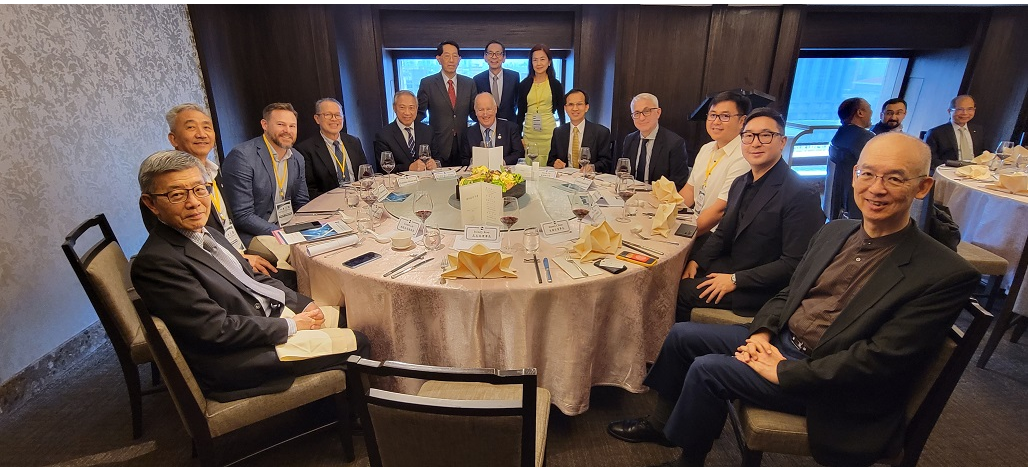
In his Welcome Remarks, Mr. Kao underscored the important role played by CACCI and the business sector in addressing the various challenges in the global market and promoting cooperation among the business communities in the region. He said that CIECA aims to contribute to this effort of achieving regional economic cooperation.
Mr. McMullin conveyed CACCI’s appreciation to Mr. Kao and CIECA for its continued strong support of the activities of the Confederation, as well as for the sustained commitment of Taiwan and the Taiwanese government in supporting the efforts of CACCI to promote the interest of the region’s business community, thereby acting as Merchants of Peace. Mr. McMullin also highlighted the SET principle that he intends to pursue during his CACCI Presidency, namely, Sustainability, Entrepreneurship, and Trade which he said are critical elements for businesses to move forward post-Covid.
The other delegates reiterated the need for more people-to-people contact in order to improve cross-mobility of businessmen and enhance economic relations between countries in the region.
Mr. McMullin and Mr. Kao exchanged Tokens of Appreciation for the opportunity to meet with each other, thereby providing a forum for the CACCI delegation and key officers of CIECA to know each other more and explore possible areas of cooperation.
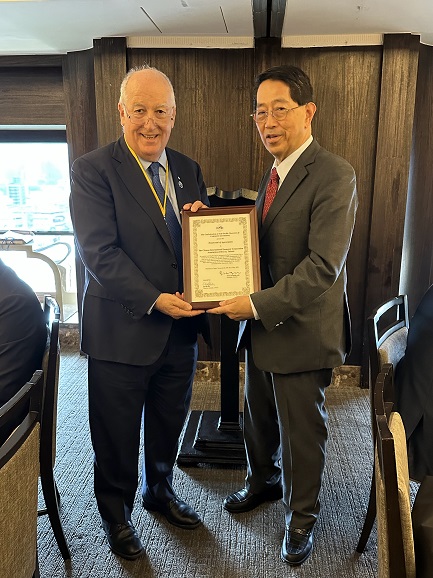
Courtesy Call on Commerce Development Research Institute
Following the lunch hosted by CIECA Chairman Mr. Henry Kao, the CACCI delegation visited the Commerce Development Research Institute (CDRI) where they were received by its key officers headed by Chairman Tain-Tsair Hsu.
After the brief Welcome Remarks of Chairman Hsu expressing his appreciation for the visit by the CACCI delegation, CACCI President Mr. Peter McMullin AM thanked Chairman Hsu for the warm welcome followed by a brief introduction on CACCI, what it does, and the strong support it receives from the Taiwanese government and business sector.
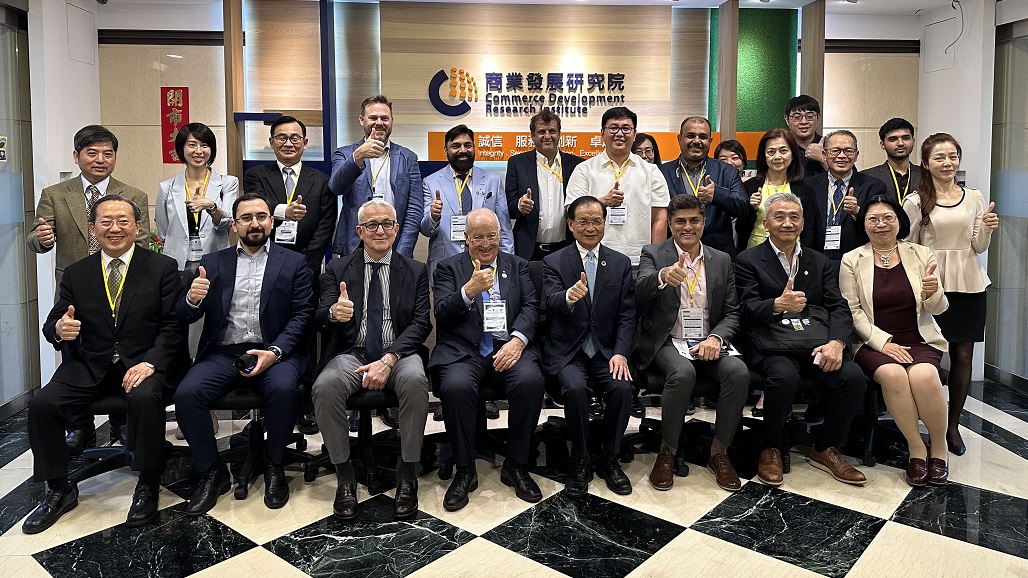
Thereafter, the other CDRI officers in attendance made presentations on the Institute and its various activities. They elaborated on the topics of cross-border e-commerce, application of market data, and how the Institute assists Taiwanese companies in foreign trade by applying value-added technologies, and the participation of CDRI in UN/CEFACT.
The CACCI visitors learned that:
(1) The CDRI was established in December 2007, and positioned as National Level Services Research think-tank. It plays the role as a platform of knowledge exchange for the government, the local industry, the academia, and research institutes; additionally, bringing in powerful resources and connections to provide suggestions to the Government as references for decision making, as well as to offer total solutions to private enterprises.
(2) As its major achievements to date, the Institute has coached 11,387 enterprises; increased enterprise revenue by NT$340.2 Billion, facilitated NT$1,253.4 Billion investment capital injection, created 378 innovative business models, and trained 41,847 service industry workers, thereby enabling industries to upgrade, transform and globalize.
(3) The Institute has also provided support to the Taiwanese governments New Southbound Policy, which target countries from ASEAN region, Australia, New Zealand and India and aim to support Taiwan companies to expand their business to the region.
At the end of the visit, Mr. McMullin and Chairman Hsu exchanged Tokens of Appreciation for the opportunity to learn more about each other’s organizations and to identify possible areas in which they can cooperate with CACCI member countries.
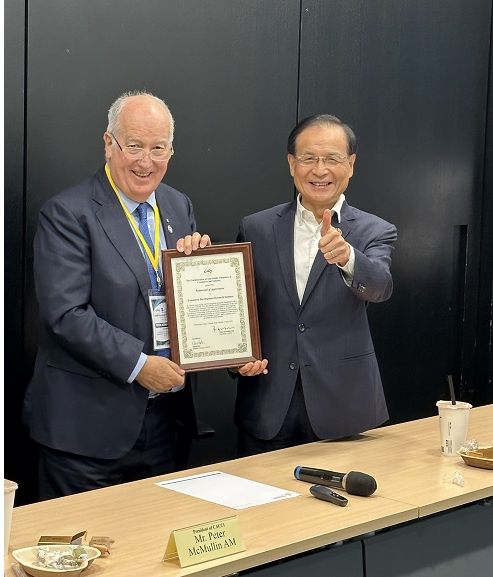
Meeting with the Importers and Exporters Association of Taipei (IEAT)
From CDRI, the CACCI delegation proceeded to the headquarters of the Importers and Exporters Association of Taipei (IEAT) and met with its key officers headed by Secretary-General Mr. Peter W. J. Huang. In welcoming the visitors, Mr. Huang said that the IEAT is proud to be an Affiliate Member of CACCI, adding that the Association is celebrating its 75th Anniversary in 2023.
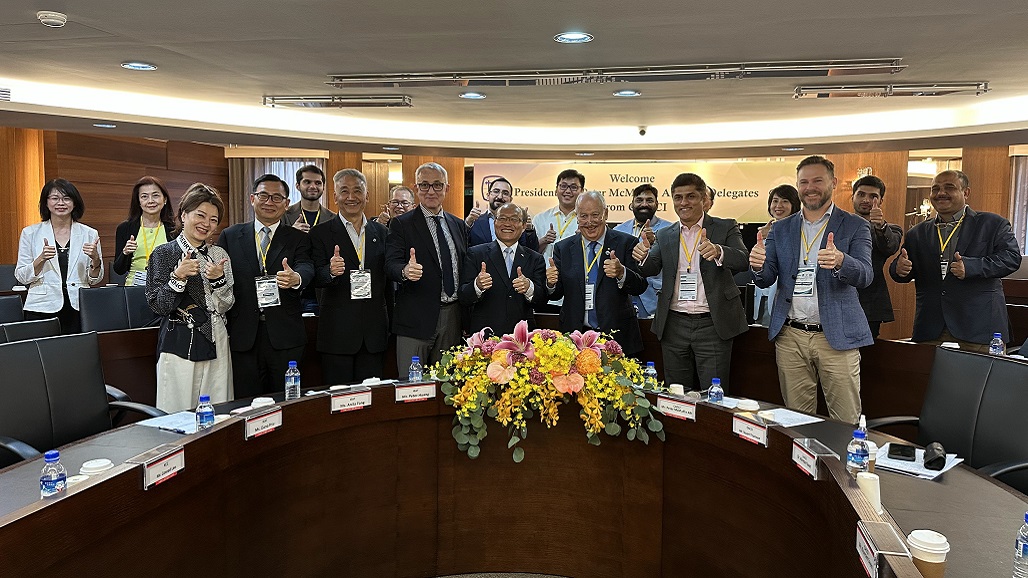
He informed the CACCI delegation that the IEAT is the biggest association of importers and exporters in Taiwan, with its members registering a total import/export value of US$907 Billion. He pointed out that trade is important to Taiwan as it serves as the economic driving force of the island. With members composed of large and small enterprises, including start-up companies, the IEAT employs some 80 staff members to provide various services to its members. Following Mr. Huang’s welcome remarks, a video presentation was shown introducing the various services offered by the Association.
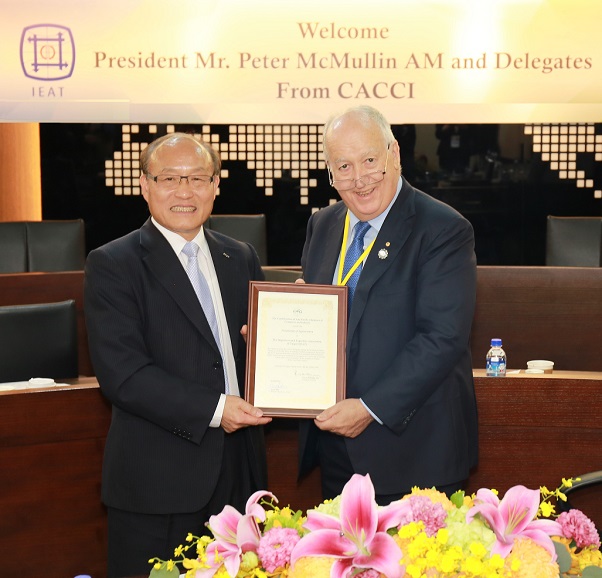
In response, Mr. McMullin cited the presence of many women in the IEAT staff, indicating that the Association is future-focused. He praised the business-like approach of Taiwan in dealing with other countries, and that CACCI, as a regional business organization, is comfortable with that approach. He added that this message from Taiwan – with its focus on resilient growth and sustainable development – resonates around the world. He stressed that the Presidential visits are a key part of CACCI’s program.
Mr. Huang informed the delegation that IEAT is ready to work with each of the chambers represented by the delegation members to promote mutual business opportunities. In response, the following comments were made by the visitors:
- There is a need to explore possible ways of strengthening the connection between Pakistani businessmen and IEAT in order to establish close liaison and partnerships in sectors such as renewable energy, textiles and textile fibers, petrochemicals, tires, and luxury products, among others.
- Many CACCI member countries are important sources of supplies for Taiwan, and vice versa, and therefore the possibility of signing MOUs with each other for this purpose as well as a regular sharing of market information (through their respective websites, for instance) should be considered.
- In the case of Iran, Taiwan can consider promoting trade in non-sanctioned sectors and products (e.g., food industry) in order to help Iranian companies which are engaged in these products and sectors, adding that there is certainly enough room for trade of many products between Taiwan and Iran, as well as collaboration in the education sector.
Mr. McMullin and Mr. Huang exchanged tokens of Appreciation for the opportunity to meet with each other, thereby providing a forum for the CACCI delegation and key officers of IEAT to know each other better and explore possible areas of cooperation.
Dinner hosted by Importers and Exporters Association of Taipei (IEAT)
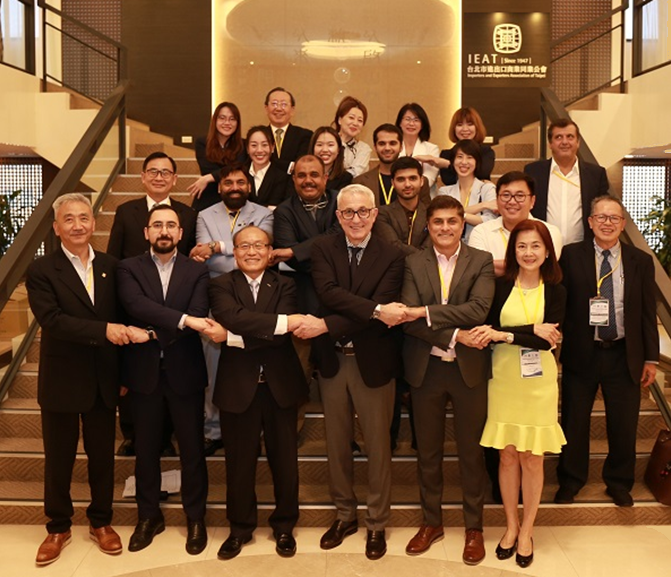
Mr. Huang and other IEAT officers later hosted dinner for the CACCI delegation at a venue located on the upper floor of the IEAT office. However, Mr. McMullin and his Chief of Staff Mr. Stuart Thomson were unable to join the dinner as they had to leave for the airport to catch up with their flight to Bangkok, Thailand where they were scheduled to attend the May 19 meeting of the Regional Committee for Asia-Pacific of the Conference of NGOs (CoNGO), an association of NGOs with consultative status with the United Nations, of which CACCI is a member.
Courtesy Call of the CACCI President on ROC President H. E. Tsai Eng-Wen
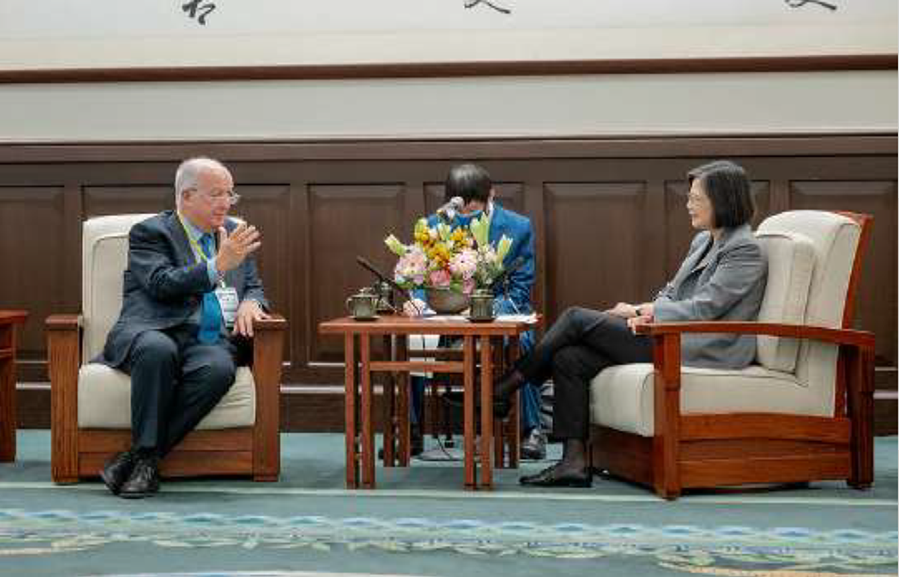
On the morning of May 18, CACCI President Mr. Peter McMullin made a courtesy call on President Tsai Ing-wen of the Republic of China (ROC), Taiwan.
In her Welcome Remarks for Mr. McMullin, President Tsai said that the nations included in Taiwan’s New Southbound Policy maintain engagement with CACCI and are key external trade partners for Taiwan. She also said that she looks forward to continuing Taiwan’s close cooperation with the Confederation to bolster connectivity among Asia-Pacific nations and make even greater contributions to the region’s economy and development.
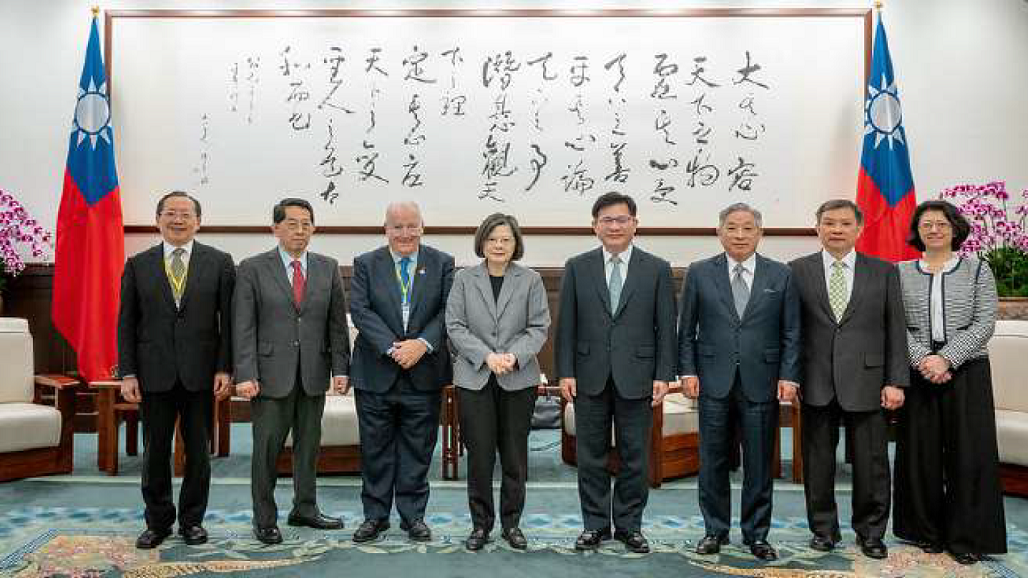
An English translation of President Tsai’s remarks follows:
“I would like to begin by congratulating you, President McMullin, on assuming the CACCI presidency last year. Having previously met with a CACCI delegation in 2018, I now extend a very warm welcome to this delegation led by President McMullin. Your visit demonstrates the profound friendship between the confederation and Taiwan.
CACCI is an important platform for economic connectivity and collaboration in our region. As a founding member, Taiwan actively works with Asia-Pacific nations on advancing sustainable development in the region.
The Asia-Pacific region holds a key position in global geopolitics and supply chains. Following the outbreak of the COVID-19 pandemic and Russia’s invasion of Ukraine, and in the face of expanding authoritarianism, resilient and secure cross-border supply chains have become all the more important. Taiwan is committed to democratic values, economic freedom, and openness, and fulfills its responsibilities to the international community. This has made us a trusted partner throughout global supply chains.
At the same time, Taiwan is using its soft power to contribute to regional development. Since 2016, we have promoted the New Southbound Policy, working with partner countries to attain tangible results in such areas as economic cooperation, talent exchange, and regional connectivity. Last year, Taiwan’s trade with New Southbound Policy partner countries reached a new high of US$180.3 billion. That same year, our exports to these nations also achieved a historic peak of US$96.9 billion – up 17 percent from the previous year. During and after the COVID-19 pandemic, Taiwan has continued to deepen exchanges with New Southbound Policy partner countries in such areas as talent cultivation, disaster prevention, and agricultural technology.
The nations included in the New Southbound Policy also engage with CACCI and are key external trade partners for Taiwan. I want to thank CACCI for valuing and supporting Taiwan. We look forward to continuing our close cooperation with the confederation to bolster connectivity among Asia-Pacific nations and make even greater contributions to the region’s economy and development.
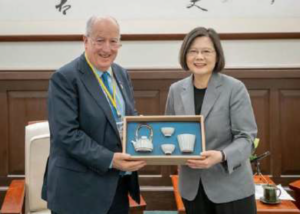 I once again welcome you and your delegation to Taiwan. I wish you all a successful trip.”
I once again welcome you and your delegation to Taiwan. I wish you all a successful trip.”
In response to President Tsai’s Welcome Remarks, President McMullin said that his delegation has been impressed by what they have seen in Taiwan and that the hospitality they have received has been exceptional. He said that the business-like nature of Taiwan is very much a comfort for the delegation members and that they have found it very easy to engage with organizations and government agencies in Taiwan.
President McMullin stated that his presidency, under the framework of CACCI, is based on three principles: Sustainability, Entrepreneurship, and Trade. He added that CACCI is working with regional and global organizations including the G20 and European chambers of commerce. Thanking the Taiwanese government for its support, President McMullin expressed his belief that “through our collaboration, we can achieve a great deal.”
Mr. McMullin also mentioned that for eight years he was the vice president of CACCI and that he visited Taiwan in 2018 with then CACCI President Jemal Inaishvili, who sends his regards to President Tsai, as do all the other members of his delegation. Noting that this is his third visit to Taiwan, President McMullin said that he looks forward to coming back soon.





